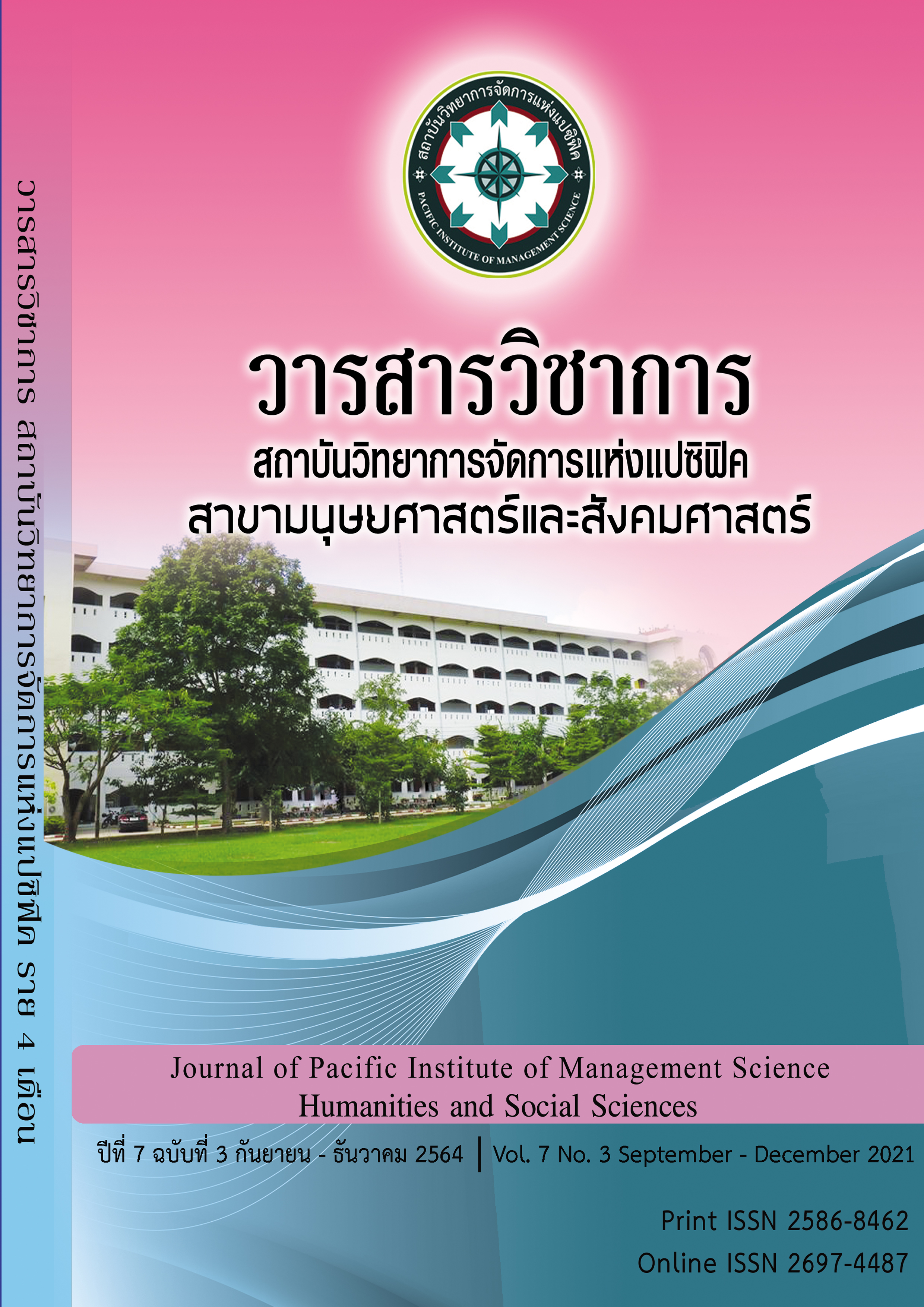The School Administration Towards Excellence in According to Four Brahmavihara of Private School in Muang District Chonburi Province
Keywords:
School administration towards excellence, Brahma Viharn 4, School administrators private in Mueang District, ChonburiAbstract
The administration of the school to excellence or the management of efficiency. The administrators should use the principles that administrators should adopt in the administration of the school to be efficient, that is: Principles of Brahma Vihara 4 This research aims to study and propose guidelines for the development of educational institutions of private school administrators in Muang District, Chonburi Province in 4 areas: compassion, compassion, and compassion.
This research is a quantitative research. An example used in this research was a private teacher in Muang District. Chonburi Province, 37 schools, total of 310 teachers. The researcher determined the sample size from the opening of the ready-made tables of Krejcie & Morgan. The research instruments were A 5-level estimation scale questionnaire had a confidence factor of 0.99.
The research results were found that The private school administrators operate in the school administration to excellence according to the Brahma Vihara principle. Overall, the work is at a high level (x̄= 3.63). The mean highest was the compassionate side (x̄= 3.66), and the side with the lowest mean. Is the aspect of empathy and diligence (x̄= 3.61) and guidelines for the development of school administration. In kindness And kindly executives can win the hearts of people who love to help as well. In terms of pleasure and Executives must have a plan for the work. Able to make good decisions and solve problems From this research Can be used to improve the management and development of work. Executives must be role models. The results of this research could benefit other school administrators as a guideline for developing the school administration to be more efficient at work.
References
จักรกฤษณ์ โพดาพลและ สมเด็จพระญาณสังวร, (2556) ผู้บริหารกับพรหมวิหารธรรม
วิทยาเขตศรีล้านช้าง(ศึกษาศาสตรดุษฎีบัณฑิตมหาวิทยาลัยมหามกุฏราชวิทยาลัย)
ชุติมา มุสิกานนท์(2555) การใช้หลักพรหมวิหารธรรมในการบริหารงานของผู้บริหารสถานศึกษา
กลุ่มเครือข่ายที่ 1 โนนแดงสังกัดสำนักงานเขตพื้นที่การศึกษาประถมศึกษานครราชสีมา เขต 7.
วิทยานิพนธ์ ปริญญามหาบัณฑิต สาขาการบริหารการศึกษา มหาวิทยาลัยเวสเทิร์น
ธีรพงษ์ บุญรักษา และ นวพันธ์ วอกลาง (2559). แนวทางบริหารองค์กรด้วยหลักธรรม. วารสารธุรกิจ
เศรฐาสตร์และการสื่อสาร ปีที่ 11 ฉบับพิเศษ มกราคม – มิถุนายน 2559 สถาบันวิจัยและวัฒนธรรมเอเชีย มหาวิทยาลัยมหิดล
นิตยา นิยมวงศ์,(2555). การศึกษาคุณธรรมตามหลักพรหมวิหาร 4 ของผู้บริหารสถานศึกษาตามทัศนะ
ของครูผู้สอน สังกัดสำนักงานเขตพื้นที่การศึกษาจันทบุรี เขต 2. ปริญญาครุศาสตรมหาบัณฑิตสาขาการบริหารการศึกษามหาวิทยาลัยราชภัฏรำไพพรรณี.
บุญชม ศรีสะอาด (2545). การวิจัยเบื้องต้น . วารสารสุวีริยาสาส์นพิมพ์ครั้งที่ 7)กรุงเทพมหานคร
พระบัวเงิน สุขธมฺโม (แสงมะณีลาด) (2561, น.6). แนวทางการบริหารงานบุคคลตามหลักพรหม
วิหารธรรมสำหรับผู้บริหาร โรงเรียนมัธยมศึกษา อำเภอละมาม จังหวัดเชกอง สาธารณะรัฐประชาธิปไตยประชาชนลาว. ปริญญาพุทธศาสตรมหาบัณฑิตมหาวิทยาลัยมหาจุฬาลงกรณราชวิทยาลัย
พระปลัดวัฒนชัยอภิวณฺโณ (ท้วมสม)(2558). การศึกษาภาวะผู้นำของผู้บริหารโรงเรียนเตรียมอุดมศึกษา
พัฒนาการ ตามหลักพรหมวิหาร ๔ เขตสวนหลวง กรุงเทพมหานคร. ปริญญาพุทธศาสตรมหาบัณฑิต มหาวิทยาลัยมหาจุฬาลงกรณราชวิทยาลัย)
พระประกอบ ถิรจิตฺโต (2558). การใช้หลักพรหมวิหาร 4 ในการบริหารงานของผู้บริหาร
ตามความคิดเห็นของบุคลากรองค์การบริหารส่วนตำบล ในเขตอำเภอเมือง จังหวัดนครพนม.
วารสารมหาวิทยาลัยมหามกุฏราชวิทยาลัย วิทยาเขตร้อยเอ็ด.
พระไพฑูรย์ เมธิโก (มหาบุญ) (2554). การประยุกต์พรหมวิหาร 4 เพื่อการปฏิบัติงานของบุคลากร
เทศบาลตำบลอ้อมใหญ่ อำเภอสามพราน จังหวัดนครปฐม. ปริญญาพุทธศาสตรมหาบัณฑิตสาขาวิชาการจัดการเชิงพุทธมหาวิทยาลัยมหาจุฬาลงกรณราชวิทยาลัย.
อุทิศ การเพียร, (2558). การบริหารบุคลากรตามหลักพรหมวิหาร ๔ ในทัศนะของบุคลากรตำแหน่ง
ปฏิบัติการวิชาชีพและบริหารทั่วไป. ปริญญาพุทธศาสตรมหาบัณฑิตมหาวิทยาลัย
มหาจุฬาลงกรณราชวิทยาลัย.
Bottoms, Gene. and Others. (2008). Good Principals are the Key to Successful School :
Six Strategies to Prepare More Good Principals, Southern Regional Education
Board, Duke, Daniel L. (2003). Keys to Sustaining Successful School Turnarounds,
Darden Curry Partnership for Leaders in Education, Charlottesville. [Online].
Available: http://www.darden.virginia.edu/uploadedFiles/Centers of Excellence/PLE/ KeysToSuccess.pdf. [2018, August 29]
Copland, M. A.(2003)Leadership of inquiry: building and sustaining capacity for school
improvement,Educational Evaluation and Policy Analysis, 25 (4), 375–395, 2003
Flores, J.M. (1994) “A Student of Teachers’ Involvement on School-based Management”, Dissertation Abstract Item, 12 (3) 43-48; May, 1994.
Hernandez, J. R. (2001). Total quality management in education: The application of
TQM in the Texas school district. Dissertation Abstracts International, 62-11A,211.
Hirtz, P. D. (2002). Effective leadership for total quality management. Dissertation
Abstracts International,63-05B, 132.
Kindred, R. M. (2002).Perception of Elementary School Principals and Selected Professors
of Education Administration Concerning Pre - Service Training and Task
Performance Capabilities. Dissertation Abstracts International. (40)8 , 495.
Krejcie,R. V. and Morgan, D (1970), Educational Administration: Theory, Research, and Practice.
Singapore : McGraw – Hill.
Magnuson, W.G. (2001) The characteristics of successful school business managers doctoral
dissertation. University of Southern California : Los Angeles Inc.
Stephen. (1998) Good Practice and Case Studies Marketing Planning in Strategy. Retrieved
May12 2018, from www.hiest.cd.uk/casestudies/marketingfepart/.htm
Stogdill, R.M. (1974) Handbook of leadership : A surveyof theory and research.
New York: The Free Press.
Taff,B.C. (1998) Teacher perceptions of principal role behavior and effectiveness Dissertation Abstracts International, 58(7),4286-Ai.
Downloads
Published
Issue
Section
License
Copyright (c) 2022 Pacific Institute of Management Science

This work is licensed under a Creative Commons Attribution-NonCommercial-NoDerivatives 4.0 International License.
บทความที่ได้รับการตีพิมพ์เป็นลิขสิทธิ์ของ สถาบันวิทยาการจัดการแห่งแปซิฟิค
ข้อความที่ปรากฏในบทความแต่ละเรื่องในวารสารวิชาการเล่มนี้เป็นความคิดเห็นส่วนตัวของผู้เขียนแต่ละท่านไม่เกี่ยวข้องกับสถาบันวิทยาการจัดการแห่งแปซิฟิค และคณาจารย์ท่านอื่นๆในสถาบันฯ แต่อย่างใด ความรับผิดชอบองค์ประกอบทั้งหมดของบทความแต่ละเรื่องเป็นของผู้เขียนแต่ละท่าน หากมีความผิดพลาดใดๆ ผู้เขียนแต่ละท่านจะรับผิดชอบบทความของตนเองแต่ผู้เดียว







